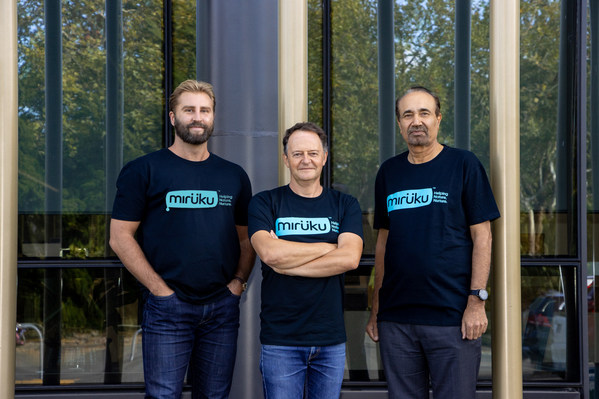Alt-milk revolution: Molecular farmed dairy nets US$2.4M, Israeli cell-based milk joins European consortium
.jpg)
23 Mar 2022 --- Two emergent technologies – molecular farming and cellular agriculture – are making a splash in the alternative dairy space for their ability to remove the cow from the equation. The ubiquitous demand for sustainable, animal-free milk alternatives has generated sizable interest and investment in this dynamic space.
Among recent developments, Miruku, a New Zealand-based food-tech company developing animal-free milk proteins cultivated in plants through molecular farming, has netted a US$2.4 million seed investment round.
Meanwhile, Israel-based Wilk – a developer of cell-based human and animal milk, and milk components – has joined Cellular Agriculture Europe, a coalition of companies committed to building a more resilient and sustainable food chain.
 Miruku co-founders (left to right) Amos Palfreyman, Ira Bing and Harjinder Singh (Credit: Miruku).Disrupting New Zealand’s conventional dairy chain
Miruku co-founders (left to right) Amos Palfreyman, Ira Bing and Harjinder Singh (Credit: Miruku).Disrupting New Zealand’s conventional dairy chain
New Zealand is the world's biggest exporter of dairy and has a strong legacy in food production.
Miruku is “tilting this position” by pioneering animal-free proteins in its own labs and greenhouses and through strong farmer, corporate and R&D partnerships.
Established in 2020 by CEO Amos Palfreyman, the start-up’s proprietary molecular farming platform is designed for scale and implementation across geographies.
The food-tech player employs a molecular farming process that “recruits plant cells as mini factories” to produce proteins, fats and sugars that have until now, only been sourced from animals.
“We share a vision that applies the sharp edge of applied science to agronomy and food tech, at scale, with global partners. Our goal is to provide nutritious and functional animal-free dairy, economically,” comments Palfreyman.
Miruku's technology will enable the development of traditional dairy products like cheese and yogurt, while opening the possibility for new product formats.
The investment round was headed by New Zealand venture capital fund Movac and includes Asia Pacific investor Better Bite Ventures, US-based Ahimsa Foundation, and NZ Growth Capital Partners via its Aspire fund.
“Miruku’s breakthrough plant technologies hold potential to produce animal-free milk proteins cost-effectively. Plants lie at the bottom of the food chain. Miruku cuts out the middlemen (cows) which convert plant energy (sugars) to proteins,” remarks co-founder professor Oded Shoseyov.
“Instead Miruku produces its proteins directly in the plants themselves. This is an elegant approach to energy and production efficiency and this efficiency is better for soil, water and atmosphere. Plant-based food systems with improved protein functionality can contribute materially to balancing human and ecological needs."
.jpg) Wilk is introducing laboratory production processes that replicate the milk-producing cells of humans and other mammals to create 100% real milk.Israeli food-tech specialist joins European consortium
Wilk is introducing laboratory production processes that replicate the milk-producing cells of humans and other mammals to create 100% real milk.Israeli food-tech specialist joins European consortium
Wilk operates at the crossroads of biotech and food-tech, developing technologies for producing cultured human breast and animal milk.
Having launched operations in 2020, the company is introducing laboratory production processes that replicate the milk-producing cells of humans and other mammals to create 100% real milk and milk components in laboratory settings.
Wilk holds a patent from the US Patent and Trademark Office for Methods and Systems for in-Vitro Milk Production and is publicly traded on the Tel Aviv Stock Exchange under the ticker symbol “WILK.”
Recently, the company was welcomed into the Cellular Agriculture Europe consortium and is currently pegged as the first and only dairy company to join.
“We are excited to collaborate with like-minded visionaries and innovators of Cellular Agriculture Europe to make a difference in the way society perceives the cell-based industry, advance regulations around cell-based foods and ingredients and lead us all to a better, more ecological future,” says Rachelle Neumann, chief marketing officer of Wilk.
Launched in December 2021 by a royal decree from King Philippe of Belgium, Cellular Agriculture Europe aims to bring together producers of cultivated meat, poultry, seafood, dairy, and other animal-based cultivated products with stakeholders to “find common ground and speak with a shared voice for the good of the industry with consumers and regulators.”
“We are delighted to welcome Wilk into our ranks of entrepreneurs and innovators working to bring cellular agriculture products to European consumers,” remarks Hélène Miller, vice president at Cellular Agriculture Europe.
“With the addition of Wilk, we now total 14 companies united in a shared vision to develop an alternative to the current food production process and create a more sustainable future for the planet.”
By Benjamin Ferrer











